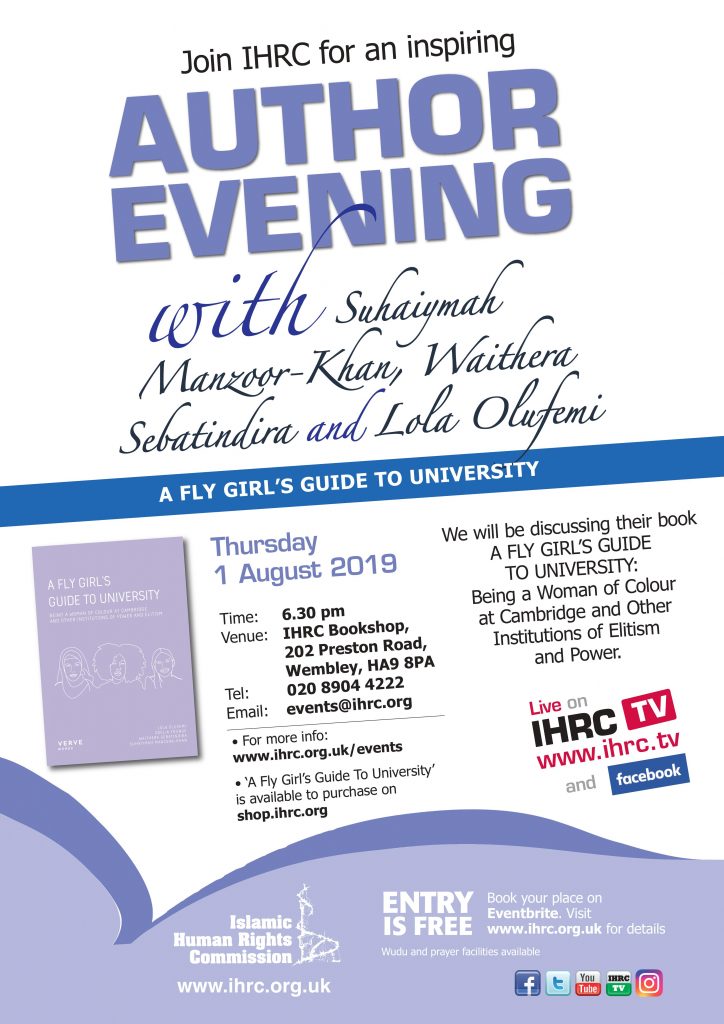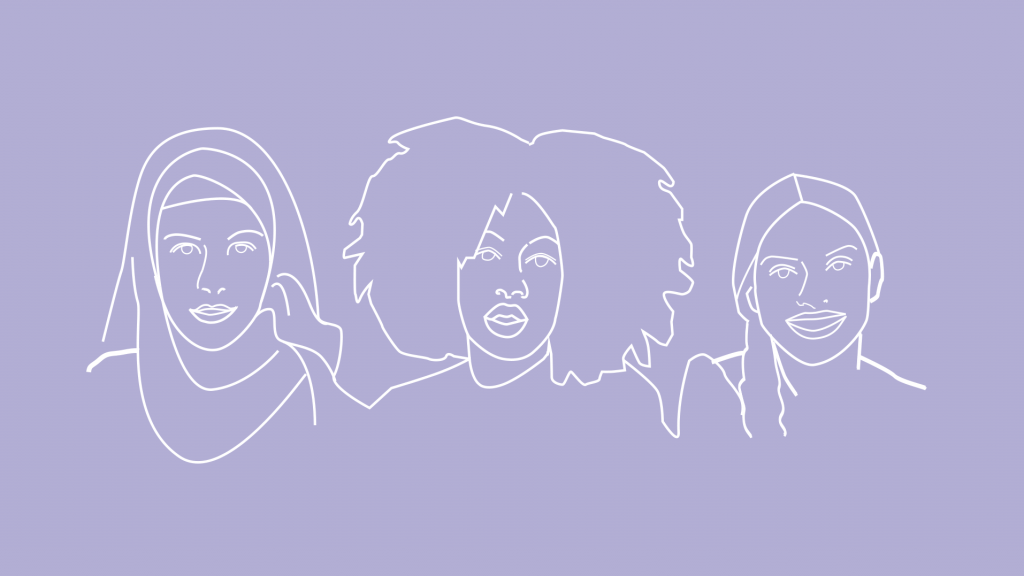The blog is back, and what a way to start.
Dear Friends,
Peace!
Just a quick reminder about tonight’s event at the IHRC Bookshop and Gallery. We are delighted to have Suhaiymah Manzoor-Khan, Waithera Sebatindira and Lola Olufemi, to discuss their book A FLY Girl’s Guide To University: Being a Woman of Colour at Cambridge and Other Institutions of Elitism and Power, with Narjis Khan chairing.
Further details about the event follow at the end.
Please do join us instore or online from 6.30pm (BST). If you are watching online you can find us on www.ihrc.tv or on our Facebook page.
You can buy the book here. Please take a few minutes to peruse our catalogue. Those of you celebrating Eid will find some exciting and original books and artwork to treat someone, or just yourself. As always all profits go to IHRC Trust, a charity registered in the UK no: 1106120. You can also add on a donation with your purchase.
As a side note those of you looking for somewhere to give Qurbani to, please consider Nigeria this year. Details here.
As always, many thanks for your support.
With prayers and peace,
IHRC Bookshop & Gallery team
Shop.ihrc.org
@ihrcbookshop
More about the book and tonight’s event (below image)

A FLY Girl’s Guide To University is available to purchase at shop.ihrc.org.
This event will be streamed live on Facebook and IHRC.TV.
Free event
Refreshments available
Wudu and prayer facilities available
IHRC Bookshop is a minute’s walk from Preston Road Underground station (Metropolitan line). Free parking on nearby residential roads is also available.
About the book:
A FLY Girl’s Guide to University is a collection of memoirs, essays, poetry and prose from four women of colour who studied at the University of Cambridge. It is a multifaceted calling out of the wrongness underpinning their shared experience at Cambridge, and the experiences of others in similar institutions throughout the UK. But they describe it best:
‘The purpose of our book is simple: we believe that our lives, our experiences, and our voices matter, especially in a place of power, pervasive whiteness and exclusivity. Our voices not only deserve to be heard but must be because the ‘Cambridge experience’ of a middle-class, white, cisgendered, able-bodied man is not the only one. Ours cannot be silenced.
‘We came together through FLY, a network specifically by and for women and non-binary people of colour at Cambridge. As members of FLY, we were all vocal and active in feminist and anti-racist politics, as well as adamant about intersectionality – whether in education, research, creating spaces on campus or in our campaigning. Through meeting there, hearing one another and experiencing our absences elsewhere, we decided to write this book. Writing gave us a language and space that we were not often afforded and a chance to live beyond the niches carved out for us by others. This book exists as a testament to our existences in a place we were often made invisible, and stands as a demonstration of the fact that we have the power to validate ourselves.
‘
We believe our book itself to be a form of activism in its fearless sharing of our experiences and in contributing to the provision of previously silenced truths. In some ways, the importance of what we say is almost as important as the fact we say it at all because the power of this book is borne from the desire to continue a legacy of recording lived experiences of those whose stories often go unpublished. We want our work to act as a disruption, a hope, and a symbol that though marginalised in many ways and many spaces, we are very much alive, evolving and powerful.’
This wonderful book needs to be read, discussed and understood, in Universities, but also in government offices, businesses and anywhere that people are made to feel excluded, estranged and exposed because of their heritage, their religion or their appearance.
About the authors:
Suhaiymah Manzoor-Khan is a writer, spoken-word poet, speaker, and educator invested in unlearning the modalities of knowledge she has internalised, disrupting power relations, and interrogating narratives around race/ism, gender(ed oppression), Islamophobia, state violence, knowledge production and (de)coloniality.
Suhaiymah founded this blog anonymously in 2014 with the aim to create space: space for her voice and space to be able to think. That space and her voice/thinking have changed/grown over the years but the archive remains as a testament to the fact that life is a learning process.
Suhaiymah was born in Bradford, raised and state-schooled in Leeds, and with a background in History at Cambridge University, and an MA in Postcolonial Studies from SOAS – alongside a wider education from the epistemology of Islam and work of women of colour and anti-systemic thinkers from across the world – she regularly writes, speaks, performs and workshops on Islamophobia, racism, feminism and poetry both nationally and internationally.
She and her work have been featured in The Independent, Al-Jazeera, The Guardian [x], on BBC Radio, ITV, Sky TV and The Islam Channel, and she has performed at TEDx conferences, music festivals, The Southbank Centre, US Slams, Da Poetry Lounge in California, in New York City and across UK universities. Suhaiymah was the runner-up of the 2017 Roundhouse Poetry Slam and her poem, This Is Not a Humanising Poem, gained 2 million online views; was short-listed for the 2018 Outspoken Prize for Performance Poetry; and has been translated into German, Italian, Spanish, Icelandic and Urdu. Suhaiymah is a Nicola Thorold Fellow at the Roundhouse for 2018 and all Suhaiymah’s work is rooted in Islam and her duty to her creator, Allah.
Waithera Sebatindira is a Law graduate from Trinity Hall and recently completed her MPhil in Multi-disciplinary Gender Studies at the same College. While facilitator of FLY, and with the indispensable support of its founders and a group of committed women of colour, she expanded the group’s membership and reach. During this time, Waithera developed a black feminist ethic that continues to be informed by the work of inspirational women she reads and meets – especially this book’s co-authors. She went on to become the first woman of colour to hold the position of full-time Women’s Officer on the Cambridge University Students’ Union and, during her tenure, campaigned on behalf of woman and non-binary students on campus while coordinating decolonial efforts across campus.
Lola Olufemi is a black feminist and organiser from London. She graduated from Cambridge with a degree in English Literature in 2016. She facilitated FLY, the group for women and non-binary people of colour at Cambridge from 2015-16 and held roles on the BME and Women’s Campaign. She was the Cambridge University Students Union Women’s Officer from 2017-18. During her time at university she was heavily involved in student activism, working on, amongst others: the establishment of support for survivors of sexual violence, decolonising the curriculum and opposing the marketisation of higher education. She is currently the NUS Second Place on the NUS Women’s Campaign & sits on the National Executive Council. She is a masters student in Gender Studies who is interested in black feminist thought as a vehicle for thinking about the self and others and disrupting systems of power. She is currently writing a book on reclaiming feminism for young people which will be published by Pluto Press in 2020.
This event will be chaired by Narjis Khan. Narjis graduated from Cambridge in 2011 with a degree in Social and Political Sciences. After qualifying as a lawyer, she completed her LLM specialising in Public International Law at the LSE. Since then, she has been working in the public sector and volunteering at various NGOs. She has been a volunteer at the Islamic Human Rights Commission since 2016. Poetry she has authored focusing on issues of social justice, decolonisation and human rights can be found on her blog on the IHRC website.







